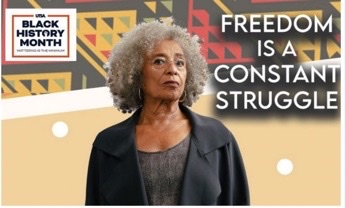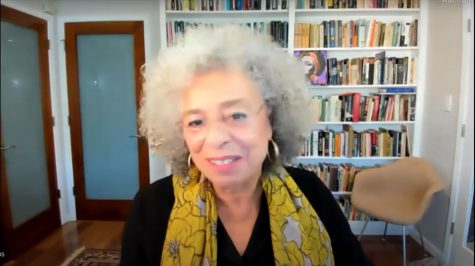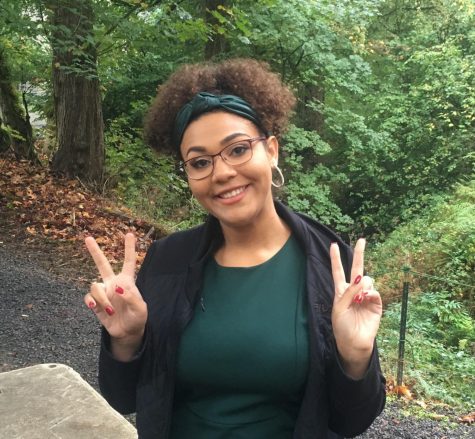Dr. Angela Davis speaks on freedom and activism
February 26, 2021
Dr. Angela Davis, American political activist, philosopher, academic and author, was hosted by UTSA on Feb. 23 as part of their Black History Month keynote event series. Dr. Davis’ keynote talk focused on the concept of freedom, the importance of collective action and leadership, as well as her own personal experiences as an activist.

During her keynote, Dr. Davis talked about her early life, including her exposure to anti-blackism and how it shaped her conviction in the movement. Dr. Davis was raised in Birmingham, Alabama, one of the most segregated cities in the United States during the 40s and 50s. Her parents were both involved in the Black Communist Party, so she was exposed to activism from an early age.
“Literally everything was segregated education, housing, neighborhoods, everything, so I grew up in an all-black community,” said Dr. Davis. “All the while, I was very frustrated because of the fact there was so much that I had no access to, but at the same time, I learned the meaning of community.”
“Over time, I came to recognize the degree to which anti-blackism is linked to other racism,”
Dr. Davis said. “We can’t really imagine white supremacy only focusing on black communities.” Dr. Davis went on to offer her perspective on anti-blackism in a larger context.
“We will never be able to extricate ourselves from anti-blackism if we don’t also address racism directed at indigenous peoples, Latinx communities, and islamophobia,” Dr. Davis proclaimed. “We often think of racism as a domestic issue, and we fail to recognize the entire planet has been polluted by racism.”
“Also, when we talk about the racist foundations of the history of this country that were referring not only to slavery but also to colonialism,” Dr. Davis said.
She also talked about what the concept of freedom means to her.
“My own sense of freedom has expanded and become more capricious as time has passed, as I’ve been involved in various struggles and as I witness that in the process of struggling for freedom one becomes aware of dimension one has not addressed,” said Dr. Davis.
“Freedom can’t be contained within a paradigm that is individualistic,” said Dr. Davis. “One can not be free alone: freedom is collective. Freedom is about transforming conditions so that communities can live in more habitable conditions.”
Dr. Davis discussed the importance of recognizing activism as a collective effort rather than an individual endeavour.
“I do not approach this work as an individual. The ideas I try to produce are not my ideas alone,” said Dr. Davis. “They are not ideas that emerge from the context of individual reflection; they’re ideas that are produced in the course of collective struggle.”
“I think internalizing the sense of fundamentally being a member of a larger community rather than an isolated individual has helped me remain optimistic and maintain my conviction which after all are collective convictions,” Dr. Davis said.
Dr. Davis described with verve and color her experience in the Black Liberation Movement and the history of black women in activism.
“When I became involved in the Black Liberation Movement, our slogan was’ ‘Free the Black Man,’” Dr. Davis recounted. “Even though there were more women than men participating in the struggle, we were calling for freedom for the black man. It took a while before we were able to incorporate gender into our vision of freedom and recognize that we have not written ourselves into the script of freedom.”


Dr. Davis described the dividedness that plagued the social movements in the 70s.
“I remember people asking, well, which are you: black or a woman,” Dr. Davis chuckled. “And of course, that’s absurd, but it gives a sense of the role that ideology plays in preventing us from apprehending the very nature of social, economic, and political equality.”
Dr. Davis posits, “Historically, the primary work of building movements has been the work of women of color.” Organizations such as the Black Panther Party and the Black Liberation Movement were largely made up of women. Yet, history largely minimizes the role women of color have played, as noted by Dr. Davis.
“The fact that women of color have played going back to the 19th century has rarely been recognized,” said Dr. Davis. “We are just now beginning to see the development of an archive that reflects the intellectual and activist labor of women of color.”
“Let us also acknowledge that finally, women are in the leadership. They have come up with new patterns of leadership: leadership is now collective.” Dr. Davis said.
Dr. Davis noted her admiration for the new generation of civic leaders. She cited the 2020 election and the people who helped increase voter turnout by unprecedented numbers, such as Stacy Abrahams, whose work has been accredited with turning Georgia Blue in 2020.
Dr. Davis’ keynote concluded with a Q&A. One question that sparked an intriguing and enlightening commentary from Dr. Davis was from a student who asked, “How do you see the difference between the January 6th radical event and those declared radicals with the Black Panther Party?”
Dr. Davis initially appeared to be shocked by the question.
“Yeah, I don’t even know if I would formulate the question in that way because there is no point of comparison.” Dr. Davis professed.
“As a matter of fact, I resent the term radical being used to describe terrorist and white supremacist,” Dr. Davis commented. “I think it’s a misnomer because the meaning of radical is root and it’s about understanding, apprehending conditions at their root rather than at the surface.”
She urged people to reflect on how the struggles of progressive and radical activists who want to see the end to suffering, exploitation, racism, and heteropatriarchy are incorrectly linked to white supremacy. Dr. Davis argues it’s not radical to do something that’s already been done.
“The Black Panthers Party and Black Lives Matter are looking to the future.” Dr. Davis asserted. “Whereas white supremacist are looking to the past they seek a sense of comfort in a past that was based on exploitation, racism, and white privilege.”











